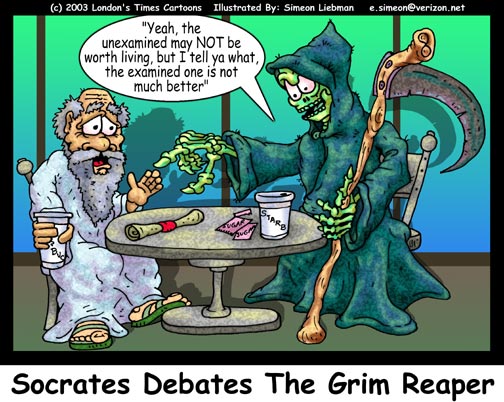And now, from the "Death, Where Is Thy Sting? Oh, THERE it is..." files, and Yahoo! News
Sudiegirl sez: Well, I thought I’d start with this story today, because it’s just so damned morbid. Whatever happened to those National Enquirer quizzes that told us, “Your preferred brand of toilet paper reveals your personality” or some rot like that? But NOOOO…boomers freak out about when they’re gonna croak, so they’re gonna jump on the chance to take this test, have five anxiety attacks in a row, and then do frivolous things to make them forget their mortality. I’m not going to fight Death, per se…I’ll probably invite him over for beer and pretzels. I figure if I’m gonna go, might as well be on friendly terms with it, right?
Test Helps You Predict Chances of Dying
By LINDSEY TANNER, AP Medical Writer
Tue Feb 14, 6:23 PM ET
It sounds like a perfect parlor game for baby boomers suddenly confronting their own mortality: What are your chances of dying within four years? Researchers have come up with 12 risk factors to try to answer that for people who are 50 and older. (Only 12? I thought there’d be more than that!)
This is one game where you want a low score. Zero to 5 points says your risk of dying in four years is less than 4 percent. With 14 points, your risk rises to 64 percent. (Aren’t there other games where you want a low score? Like various forms of rummy? I know the old “Mad Magazine” game declared whoever lost all their money first to be the winner. My sister and I played that game with one of our cousins once, and he couldn’t quite grasp the concept that being a loser pays off. Who knew?)
Just being male gives you 2 points. So does having diabetes, being a smoker, and getting pooped  trying to walk several blocks. (Well, my dad had four. Not sure about the rest…)
trying to walk several blocks. (Well, my dad had four. Not sure about the rest…)
Points accrue with each four-year increment after age 60. (I wonder how my grandma and grandpa that lived to be in their hundreds would have scored? They drank Mountain Dew every day, and Grandma believed that gravy went with everything, or damn near everything…)
The test doesn't ask what you eat, but it does ask if you can push a living room chair across the floor. (As long as they don’t ask if I can eat a living room chair, I’m cool.)
The quiz is designed "to try to help doctors and families get a firmer sense for what the future may hold," to help plan health care accordingly, says lead author Dr. Sei Lee, a geriatrics researcher at the San Francisco Veterans Affairs Medical Center, who helped develop it. (Well…I sort of agree with that statement, but by the same token, life is unpredictable. I mean, how many cancer patients out there have been given a year to live and live two to three times longer than expected? Or someone like Jim Henson who came down with something that would have been curable had they caught it early, but instead knocked him down at a relatively young age? You can only firm up the future so much…it’s not like Jell-o or ice cubes.)
"We know that patients and families want more prognostic information from doctors," Lee said. "It's a very natural human question of, 'What's going to happen to me?' We also know that doctors are very cautious about giving prognostic information because they don't want to be wrong." (I can’t say as I blame them there.)
This test is roughly 81 percent accurate and can give older people a reasonable idea of their survival chances, Lee and his colleagues say. (Well, that’s a subjective statement. Why is it that sometimes 81 percent is OK – like in school – and other times, it’s not OK – like at work or with birth control? I’ve never understood that.) Of course, it isn't foolproof. Other experts note it ignores family history and it's much less meaningful for those at the young end of the spectrum. (Plus there’s many other factors…are you accident prone? Do you have a tendency to choke on your own vomit? Have you ever ridden in a car while Shannen Doherty was driving? Have you ever gone hunting with Dick Cheney, or gone to a party at Phil Specter’s house?)
Of course, it isn't foolproof. Other experts note it ignores family history and it's much less meaningful for those at the young end of the spectrum. (Plus there’s many other factors…are you accident prone? Do you have a tendency to choke on your own vomit? Have you ever ridden in a car while Shannen Doherty was driving? Have you ever gone hunting with Dick Cheney, or gone to a party at Phil Specter’s house?)
The researchers even warn, Don't try this at home, saying a doctor can help you put things into perspective. (Unless it’s Dr. Kevorkian.)
"Even if somebody looks at their numbers and finds they have a 60 percent risk of death, there could be other mitigating factors," said co-author and VA researcher Dr. Kenneth Covinsky. (Yeah, like not taking tests like this.)
There are things you can do to improve your chances, he notes, such as quitting smoking or taking up exercise. (Did I mention taking tests like this also create lots of stress so you should ignore them?)
The test is based on data involving 11,701 Americans over 50 who took part in a national health survey in 1998. Funded by a grant from the National Institute on Aging, the researchers analyzed participants' outcomes during a four-year follow-up. They based their death-risk survey on the health characteristics that seemed to predict death within four years. (Surveys are interesting creatures…especially if the answers are anonymous. You can lie your ASS off and totally screw up statistics for years. I love the scientific age, don’t you?)
Their report appears in Wednesday's Journal of the American Medical Association. (Somehow I have the feeling this report will be withheld from Rancho Sudiegirl, Inc. I can’t imagine why!)
Dr. Donald Jurivich, geriatrics chief at the University of Illinois at Chicago, took the test and got a nice low score. Jurivich is 52. He said he'd feel better about his score if both his parents hadn't died prematurely. (Do’h!)
He praised the survey for measuring people's ability to function — such as being able to move a piece of furniture or keep track of expenses — signs that can be more telling than other health factors. (Well, based on that, I’m SOL.)
Dr. George Lange, a 57-year-old internist at Columbia-St. Mary's Hospital in Milwaukee, faulted the test for not measuring blood pressure or cholesterol. Lange got a healthy low score on the test, too, but he's overweight. He was surprised he didn't get points for that. (Hmmm…maybe I like this test after all! Pass the French fries and mayonnaise!) 
In fact, that's one of the most puzzling aspects of the test. People with a body-mass index of less than 25 — which includes normal weight people — get a point while those who are overweight aren't penalized. (You make that sound like it’s a bad thing…)
Covinsky, one of the test designers, said that BMI measurement includes underweight people — those who have lost weight because of illness, a particularly disturbing sign for the elderly. (Yep. I would have to agree with that.)
As to obesity, Lee noted there are more points for diabetes and for difficulty walking several blocks — both associated with excess weight. (Or being underweight…can’t forget that.)
The researchers think their mortality predictor might be a useful tool in the "pay for performance" trend that is part of the nation's health care system. Medicare and other insurers are increasingly basing reimbursement rates on how patients fare, said Covinsky. (Oh, man. Not pretty…not by a long shot.)
"One health plan can look better just by cherry-picking health care patients" and accepting only the most robust patients, Covinsky said. This test could give a more accurate assessment of health plans, he said, so that "you can actually see which ones are taking sicker patients and compare that" when measuring performance. (This is kind of confusing to me. So they’re saying that Medicare reimbursements are based on how healthy the patient is before going into treatment? HELP!)
Sudiegirl’s final opinion?
As The Who says, “Hope I die before I get old.”
___
On the Net:
JAMA: http://jama.ama-assn.org













 /div>
/div>






|